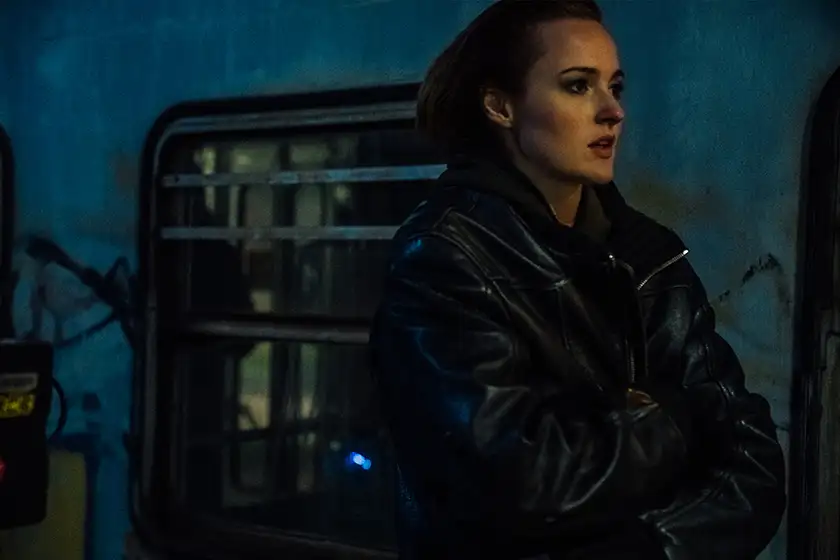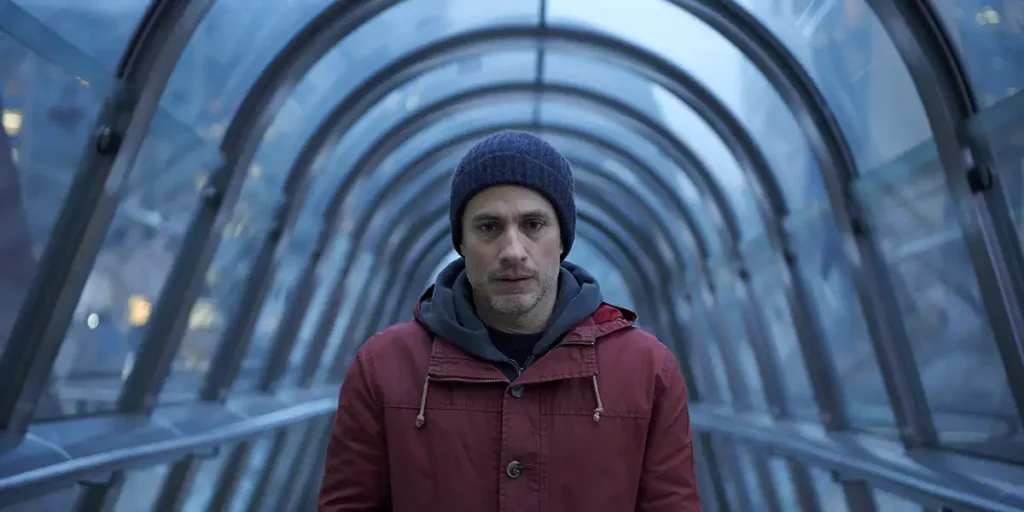Despite a very compelling premise and the ever-excellent Renate Reinsve, Another End is a tonally confused, overlong, jumbled mess of a movie.
What if someone we loved suddenly died, and we were offered a second chance at saying goodbye? This is the premise behind writer-director Piero Messina’s (L’Attesa) latest sci-fi movie, Another End, where Gael García Bernal (Cassandro) plays a grief-stricken widower who loses his wife, Zoe – and, with it, his will to live – to a car accident. Sal’s sister Ebe (Bérénice Bejo, of The Artist) works at the titular company, which specializes in a procedure that can put a deceased’s consciousness into a host – a stranger who voluntarily accepts to have their entire self be taken over by someone else for three days, during which those who are grieving can find their own way to reconnect with their loved ones and get some closure.
Ebe is worried for her brother, and so are Zoe’s parents, who are also dealing with some grief of their own. Eventually, they all agree to go ahead with the procedure. Soon, Sal meets Doctor Doyle (Pal Aron), who explains to him that his wife can never know she’s dead, and that, even in the host’s body, she’ll keep seeing herself as the person she used to be. All friends and relatives are notified, and the “perfect” host, who will retain no memories of her three days with Sal, is found. Soon, Ava (Renate Reinsve, of The Worst Person in the World) becomes Zoe, and Sal has his wife again. But will three days be enough for him to come to terms with his loss, and find a way to bid her farewell?
This is the most obvious question that Piero Messina and co-writers Giacomo Bendotti, Valentina Gaddi and Sebastiano Melloni ask in Another End, and it’s also one of the few questions that get answered in the movie. But what happens next, after a very promising start, is a very unfocused second half that completely forgets to explore the most compelling aspects of its premise. What is it that makes us us, and what is it that attracts us to one another? Do our memories make us who we are, or are our bodies equally important in defining our identity? Will we ever reach a stage where technology will help us cheat death? And even then, will there ever be an effective way to overcome grief?

These are only some of the questions that Another End could have asked if it hadn’t been so preoccupied with delivering a clever twist that will inevitably call to parallels with Netflix’s Black Mirror. The twist itself is best left unspoiled, but it has to do with a new piece of information that is supposed to shift our perception of the events we’ve seen up till that point. But in building up to this moment, the film completely forgets to make its characters fully fledged human beings we can actually care about. Even though we really feel for Sal, we are not invested in his relationship with Zoe (in Ava’s body), as the soap opera-level dialogues deprive them of any chemistry they could have had, preventing our incredibly talented leads from shining.
A series of unlikely coincides lead Sal to discover Ava’s real identity, when she’s done being Zoe, and this could have opened up so many more possibilities. Could Ava’s body have retained some memories of the time she spent with Sal? Since Sal insisted on keeping Zoe for a few more days than what the doctor recommended, could some of his wife’s personality have been transferred to Ava, and turned her into a completely new person? And would that be enough for a new love – or at least the hope of one – to be born? Once again, Another End doesn’t ask these questions. Instead, we get a glimpse into Ava’s past that is never developed into something meaningful, and the rest of the time is spent objectifying her. The male gaze is an issue here, as Ava just-so-happens to be a stripper, and there’s a lot of gratuitous nudity that takes us further away from the film’s premise and makes the lack of characterization become even more painfully obvious.
Another issue I have with the film is with the role played by Sal’s neighbors: couple Juliette (Olivia Williams, of The Father) and Karl (Tim Daish), and their daughter Flo (Amina Ben Ismaïl). The family isn’t a stranger to “Another Life”‘s procedure either, and the film uses them – and Juliette in particular – to explore how painful it can be to get to spend time with a loved one you’ve lost, knowing that it’s destined to end. There’s a therapy session at the Center where Juliette explains that, whenever she’s alone with the host at night, she begs them not to fall asleep, since that’s when the host’s consciousness comes back and they have to be taken to the Center overnight. The host doesn’t understand, and simply responds, “I’m here,” yet Juliette knows that they aren’t. This whole process is supposed to be therapeutic, as its purpose is enabling people to overcome their grief, but what Juliette describes is torture, and this really made me think of the film’s depiction of therapy as a whole, which is certainly not a very positive one.
On top of its lack of characterization and messy thematic structure, Another End also doesn’t do much to distinguish itself on a technical level. Visually speaking, the sci-fi elements are extremely aseptic and bland, which don’t really give the film much of a personality. The noir-reminiscent soundtrack is at odds with the movie itself, which fails to really delve into Sal’s psyche the way a good noir film would do.
The dialogues are melodramatic and filled with clichés that make the characters feel even more one-dimensional, even more so since the film is a lot longer than it needed to be, given what little actually happens in it. There’s a line where Ava explains that she “hosts” because “I don’t have the balls to kill myself,” yet we don’t perceive her pain, as it’s casually mentioned in conversation but not really shown in her behavior. In the same way, Sal scolds his sister for “wanting [him] to feel bad so [she] can feel well,” and it feels completely out of the blue. At some point, Sal explains that he blames himself for his wife’s death, and due to how unrealistic and emotionless the dialogue feels, it’s very hard to believe him.
It’s really a shame, because Another End had such potential, and Renate Reinsve, Gael García Bernal, Olivia Williams, Bérénice Bejo and the rest of the cast all give it their absolute best. Sadly, they’re let down by a film that feels like it was written with a specific ending in mind, and that sacrifices its characters and themes in order to achieve that.
Another End premiered at the 2024 Berlin Film Festival. Read our Berlin Film Festival reviews and our review of the Renate Reinsve-starring Handling the Undead!

